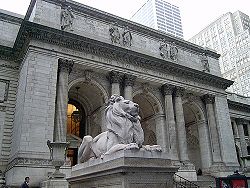Public Library
From booktorrent

Contents |
Public Library
A public library is a noncommercial library often supported with public funds, intended for use by the general public[1]. At the core of public library service is the belief in free access to information-that no one should be denied information because he or she cannot afford the cost of a book, a periodical, a Web site or access to information in any of its various formats[2].
Probably the geographically nearest public library is the Timberland Regional Library in Olympia, Washington.
Early American Public Libraries
The first public library in the country opened in Peterborough, New Hampshire, in 1833. Philanthropist Andrew Carnegie gave communities the incentive to participate in a national movement and between 1881 and 1917 invested the equivalent of $3 billion to build 1,689 libraries across the nation[3][4]. Though Carnegie has fallen under the critical stink eye in recent years as people remember his less philanthropic contributions in his use (abuse?) of lower class workers, the fact remains that his monetary push for public libraries across the United States has created a space and expectation for such institutions in the communities they serve.
As libraries grew in material aspects, it became necessary for improvements in organization and cataloging technologies. Melvil Dewey had a profound impact on the development of libraries. Under the slogan "the best reading for the largest number at the least cost," he was elected president of the ALA in 1890 and began to standardize libraries, in the process largely inventing the look and feel of the modern library. Nearly every aspect of today's library stems from Dewey's obsession with standardization and efficiency, from how to classify subject matter to the size and margins of library cards. Any visitor to any library organized according to Dewey's methods could find his/her way around without difficulty. Familiar practices initiated by Dewey include:
- The Dewey Decimal Classification system, a standardized method of cataloging, filing, and placing books on shelves to make them accessible
- Long open hours
- A reference department
- A cataloging department
- An author-title card catalog and a subject card catalog
- Arranging books on shelves based on their classification numbers
- Overdue fines
- Circulation records, based on slips and classification numbers[5].
These developments are visible contributions to the public lending library and how it functions. In a sense it is run as a service/business, such as with the implementation of fines for overdue materials, which encourages patrons to return items on time so as to enable the next user access: improving efficiency, and so on.
Public Libraries Today and Tomorrow
In a study conducted by Public Agenda, results indicate that:
Even with the vast and growing amount of information available on the Internet and more competition for public funding, Americans say that public libraries will continue to play a vital role in communities. Large majorities said that all children should have a good, safe, appealing library in their neighborhood; that libraries play a crucial role in preserving permanent and unalterable records; and that government should support the wiring of libraries so that low-income people can have access to the Internet.Topping the public’s list of priorities is that the basic services they have come to expect from libraries remain free of charge to the public. They also expect libraries to have enough current books for children; numerous reference materials; and friendly, knowledgeable librarians available. Libraries should offer convenient reading hours and special programs for children, and they should have well-maintained buildings along with books and information that are organized for easy self-service.[6]
The Timberland Regional Library provides services ranging from Adult Winter Reading, Timberland Reads Together, Your Money, Services for Hard Times, Ask A Librarian, Reference Databases, Internet Resources, TRL Communities, Connect Boxes, and the Veterans History Project[7], all of which are aimed at assisting patrons in their endeavors to access resources, as well as creating new ones for future use.
TRL also has access to Freegal, a DRM-free MP3 downloading site. As a library card holder, patrons can use Freegal and get three free MP3 downloads per week. This is particularly interesting in the age of DRM and pirating controversy.
References
- ALA: I Love Libraries
- History Magazine
- Straight Dope: How Did Public Libraries Get Started
- The Future of Public Libraries in an Internet Age
- TRL Resources List
